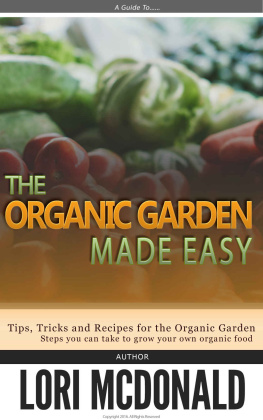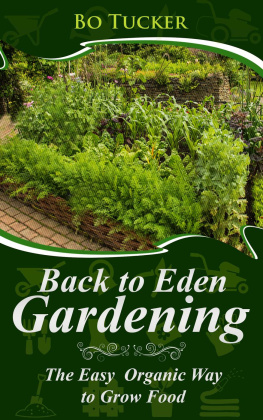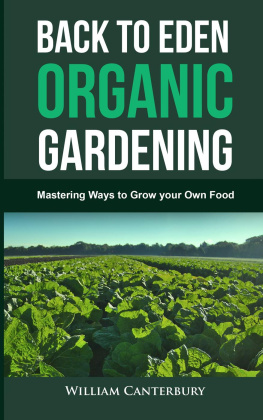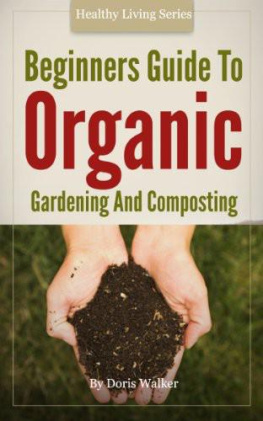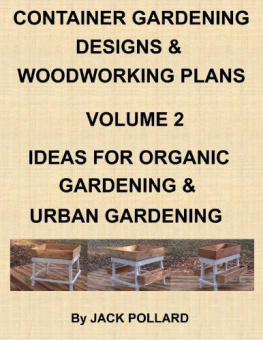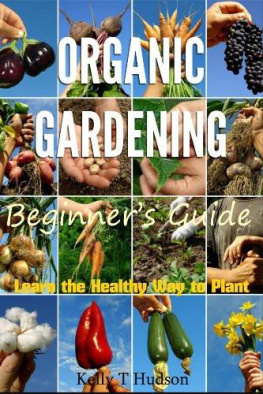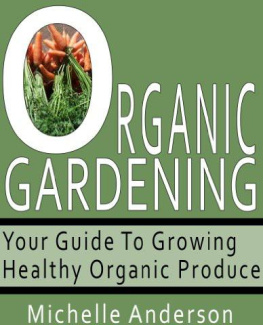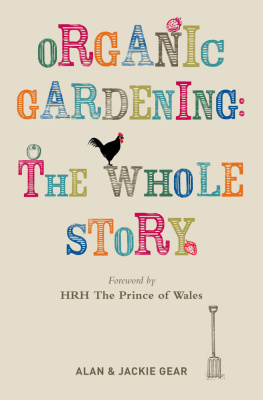Lori McDonald - The Organic Gardening Made Easy
Here you can read online Lori McDonald - The Organic Gardening Made Easy full text of the book (entire story) in english for free. Download pdf and epub, get meaning, cover and reviews about this ebook. year: 2016, genre: Home and family. Description of the work, (preface) as well as reviews are available. Best literature library LitArk.com created for fans of good reading and offers a wide selection of genres:
Romance novel
Science fiction
Adventure
Detective
Science
History
Home and family
Prose
Art
Politics
Computer
Non-fiction
Religion
Business
Children
Humor
Choose a favorite category and find really read worthwhile books. Enjoy immersion in the world of imagination, feel the emotions of the characters or learn something new for yourself, make an fascinating discovery.
- Book:The Organic Gardening Made Easy
- Author:
- Genre:
- Year:2016
- Rating:5 / 5
- Favourites:Add to favourites
- Your mark:
- 100
- 1
- 2
- 3
- 4
- 5
The Organic Gardening Made Easy: summary, description and annotation
We offer to read an annotation, description, summary or preface (depends on what the author of the book "The Organic Gardening Made Easy" wrote himself). If you haven't found the necessary information about the book — write in the comments, we will try to find it.
The Organic Gardening Made Easy — read online for free the complete book (whole text) full work
Below is the text of the book, divided by pages. System saving the place of the last page read, allows you to conveniently read the book "The Organic Gardening Made Easy" online for free, without having to search again every time where you left off. Put a bookmark, and you can go to the page where you finished reading at any time.
Font size:
Interval:
Bookmark:
The Organic Garden Made Easy
By Lori McDonald
Table of Contents
Gardening means different things to different people; for some, its a passion, for some, its a source of income while for others it is nothing more than hobby just to keep themselves busy. Well, you dont necessarily have to be from the South or be a woman, or even wear a funny hat to enjoy gardening. Sometimes, the excitement of seeing your first ripe green vegetable or your first flower stalk can be an unforgettable experience for most people.
Another thing about gardening is that it is also a great way to provide pure healthy food for you and your loved ones. Theres nothing compared to the natural taste the food from your garden gives you especially one you worked on with your own hands.
Gardening is becoming popular because it eliminates the presence of preservatives in food which is common to foods that are grown commercially. This is because a lot of these foods are cultivated under controlled conditions with artificial growth enhancement and other chemicals in order to make it palatable.
Research has shown that these chemicals have unnerving side effects on the body with the possibility of causing lasting damages to the human body. This is why a lot of people are turning to organic sources of food produce just to try and extend their lives; after all, we are what we eat.
Embracing organic gardening might be the best thing to do since the embrace of technology as the risks from consuming chemically-prepared foods will reduce. This will even give you a feeling like never before and some sense of fresh hope considering you will be getting your produce fresh from the field.
Its actually easier than you think and it does not matter if youve been gardening for years or are just beginning to grow your own food, theres a feeling of peace and fulfillment that comes with organic gardening. Should it be that you are reading this book and have no idea how to start organic farming, then you are on the right track as this book will be teaching you everything that you need to be successful in organic farming. Basically, you will be taught how to control pests naturally without using chemicals as well as the principles of mulching, weed control, and composting.
Over 20 years ago, gardening sounded strange to a lot of people as there was the feeling that there were too many external factors that could not be controlled which will make gardening difficult. Questions about weed control, bug extermination without the use of chemicals were raised because people were used to all kinds of farming with one form of artificial input or the other.
In reality, organic gardening is not so hard to wrap ones head around. I mean people have been growing things for years without using chemicals or some form of artificial additives. The early men never had any chemicals at their disposal and yet they cultivated crops successfully and produced their own food by themselves. So nothing stops us from doing the same; all we need to do is make use of the resources that nature has provided and steer clear of potions straight out of a chemists laboratory.
But the interest in organic gardening is not just because of the benefits it holds for us and our families, but also for the environment. A lot of the chemicals we use are hazardous to the environment and if the environment should become unbearable that we find it difficult to live in, then whats the point of existence. Hence, the reason for a rise in the study of ecology and concern about the environment and organic gardening is seen as a way out. All you need to do is to take advantage of natural predators, recycle garden waste and overall make use of natural minerals to produce what you need.
Organic gardening holds many advantages with the foremost one probably being that the food from it is healthier, safer and provides more nourishment due to the fact that it contains little or no amount of chemicals found in abundance in the produce of todays supermarkets.
A report released by a British organization known as the Soil Association in early August 2001, showed that there are definite and unmistakable differences between foods grown organically and those grown inorganically in terms of safety, primary nutrients, secondary nutrients and health outlook.
On the average, Vitamin C and dry matter contents are higher in organically grown crops then they are in non-organic crops. Mineral contents are also higher, and food grown organically is believed to contain significantly higher concentrations of antioxidants and other health promoting compounds than crops produced with pesticides.
A lot of people feel that foods that are grown organically taste better. Also, it has been found that some of these organically-grown foods that contain no pesticides produce a higher amount of an anti-oxidant that has been found to reduce the risk of some cancers.
Overall, though, most people who enjoy organic gardening submit that the fulfillment they feel or derive from it all stems from veering from the artificial route and getting into the natural way of producing food.
Theres an extra freshness that comes with organic gardening, either in the form of newly picked peas or freshly picked fruits. Just that feeling that you cultivated it yourself and then pick it fresh is an incredible one.
Apart from saving money as a result of growing your own food, you can also make some extra money from selling some of these natural foods that might be in excess after taking the one that you need. Theres always the farmers market where you can sell your organic foods to those who dont have the privilege of having their own garden. Trust me when I tell you that you will make sales because people are realizing the danger in chemically-grown foods and turning to naturally-grown ones.
If you are still skeptical about the need for an organic garden, then here are scientific facts to back up all that have been said and possibly change your mind. In March of 2001, the American Cancer Society published a report linking the use of the herbicide glyphosate (commonly sold as Round-up) with a 27% increased likelihood of contracting Non-Hodgkins Lymphoma.
Furthermore, John Hopkins University also revealed that home gardeners use almost 10 times more pesticide per acre than the average farmer and that diseases caused by environmental illness, exposure to chemicals etc., is now the number one cause of death in the U.S. With the EPA's recent prohibition of common pesticides such as Dursban and Diazinon, it is now dawning on people that many of the chemicals that were thought to be "safe" were never actually tested to see their effect on children, women, and the elderly. This has then generated the awareness about a need to reassess our dependence on pesticides.
You may then have this question bothering you, if chemicals are so bad, then why have we been using them all this while? Well, lets closely examine chemicals.
Chemicals just seem to be everywhere now in our everyday lives; looks like its one of the perks of having technology. Chemicals are seen in the products we use regularly such as soap or detergents, toothpaste, shampoo, various foods, even our clothing contains one form of chemical or the other. Apart from polluting the environment, chemicals pose a real threat to human lives and with their use in food production, they have the perfect opportunity to cut short human lives. Fertilizers is one prominent form in which chemicals are used as they help to reduce the waiting period required for these crops to mature but they also have side effects which include the following:
Font size:
Interval:
Bookmark:
Similar books «The Organic Gardening Made Easy»
Look at similar books to The Organic Gardening Made Easy. We have selected literature similar in name and meaning in the hope of providing readers with more options to find new, interesting, not yet read works.
Discussion, reviews of the book The Organic Gardening Made Easy and just readers' own opinions. Leave your comments, write what you think about the work, its meaning or the main characters. Specify what exactly you liked and what you didn't like, and why you think so.

